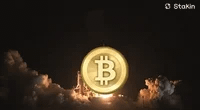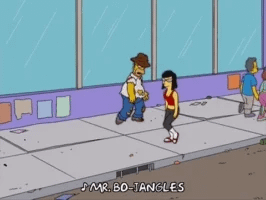Gm. Wagmi. Maybe not you; you might not make it. Maybe not even me. But what movement does not have words to inspire its believers? And if you aren't a believer in crypto, all I can tell you is this - ngmi.
Some things you should keep in mind as you read:
Gm - Good morning.
Wagmi - We're all gonna make it.
Ngmi - Not gonna make it.
CBN - Central Bank of Nigeria.
NFT - Non-Fungible Token.
ENS - Ethereum Name Service.
TL;DR - Too long; didn't read.
This year has seen even more people talking about blockchain technology. Seeing a bank manager with Binance on his phone, even though banks themselves are the primary upholders of CBN's ban, made me realize just how much. And then seeing my Bolt driver using it too. So here I am, an evangelist, trying to ensure you make it. Trying to walk you through our common thought process. Caveat - not the thought process of those that wish to get rich quick through crypto; people who don't understand, who just know they can get a 50% profit on their money back in a day. Nope, I'm here to walk you through the thought process of those of us that have hopes for the blockchain technology. Who hope that it is somehow part of the future. We would also like to make 50% profit in a day, but we will pretend to relegate those aspirations to the side.
Obligatory disclosure - I am biased in favour of the blockchain technology. I might briefly mention its failings, but follow with how fiat (along with other competitors of blockchain technology) is much worse. I write code to run on the Ethereum blockchain and hold a few coins, so it's in my interest for the blockchain technology to be successful. However, I also hope to show you that my bias was hard-won. More importantly, I want you to leave this article with a new-found bias.
First, why do we think wagmi? What does it even mean? The short answer is we're all gonna make it. It is much more than that. To explain, you need to understand what the blockchain technology represents - decentralization. Maybe you've heard this before, maybe you haven't. Either way, it's likely to be vague and do nothing for your understanding. Decentralization is taking away the power to influence value from the government and giving it to the people - financial anarchy, the likes of which haven't been seen since the days of Robin Hood. If the thought of plain anarchy isn't enough to convince you, I can go further.
People often ask, why should we take away power from the government? I ask, why not? The government shouldn't have any power it doesn't need. This is especially true of the government is prone to abuse it; ergo, all governments that have existed. Some governments are even worse than others. Welcome, Nigeria. The naira is falling. Prices of goods are rising. Value is being lost. In fact, bank accounts are getting blocked without due process and for the most outrageous reasons. The government continues to make puzzling decisions. We, middle and lower class denizens of the country, run into the warm embrace of crypto wallets to preserve value and fight poverty. And we are winning! The CBN's next step is to attempt stopping people from trading cryptocurrencies. Get this: we wanted to preserve the value of our money and avoid an authoritarian regime, and the CBN's response is even more authoritarianism and an attempt to force us into poverty. This, by itself, is enough to convince me to flip naira to ether - I don't know about you. Question: will you choose to make it or not?
Of course, wagmi isn't just about this. There is also the promise of riches to be had. After all, every great movement needs to promise its staunchest believers something. God promises heaven, the devil promises pleasure, and crypto promises wealth. It's already happening: ENS airdrops, NFT flipping, and climbing crypto prices. The middle class now has a clear path to become wealthy - this is the promise of wagmi.
I am not saying crypto is perfect. It won't suddenly heal all financial diseases. It definitely will not be creating better financial inclusion. It has a high technical barrier of entry and mostly rewards believer who are willing to literally put their money where their faith is. Many startups are in the business of lowering the technical barrier of entry, but not so much can be done for such a young industry. And naturally, crypto might favour the already rich. It's easier to buy a bunch of virtual coins when you aren't worried about where your next meal will come from. Also, you might even lose your money. Still, it's worth the consideration.
Earlier, I hinted at the competitors to crypto and the blockchain technology in general being more than just fiat. It's easy to summarize web 3.0 into just the coins that will (hopefully) make us rich. However, it's much more than this. Creating an internet system that makes sending money easy is just one aspect. Welcome, NFTs. The Vunderkind gives an amazing explanation of what NFTs are. You should read it. Still, TL;DR: NFTs are unique tokens that represent ownership of something. The most common application currently is to digital art. In fact, the knowledge many people have of NFTs is limited to this context. Try opening up your mind. Beyond art, NFTs can represent ownership of anything at all. A piece of land? Easy, let an NFT show that I own it. Shares of a company? Maybe an NFT shows I own it. One implementation of NFTs is the Ethereum Name Service which allows people to own human readable versions of Ethereum addresses.
Like a bar on Friday, there is a dish for everyone where the blockchain is concerned. If you aren't finding something that interests you the slightest about it, maybe you aren't digging deep enough or opening up your mind. For me, it's the possibility of a land registry system on the blockchain. Nick Szabo wrote about this. Many others, really, have explored it. And it's exciting. Some places have even begun applying it, such as the Republic of Georgia, Ukraine, and Brazil. Every person with the slightest knowledge of land law or purchase in Nigeria will tell you that the single greatest problem concerning buying a piece of land is getting a valid title. In one fell swoop, the blockchain could solve this.
Gm. Wagmi. If you're still not a believer, I can say that I tried when I face the crypto lords. Ngmi.




Learning about web3 and I hope to be a block chain developer. So this is me learning about block chains and developing my self.
WAGMI